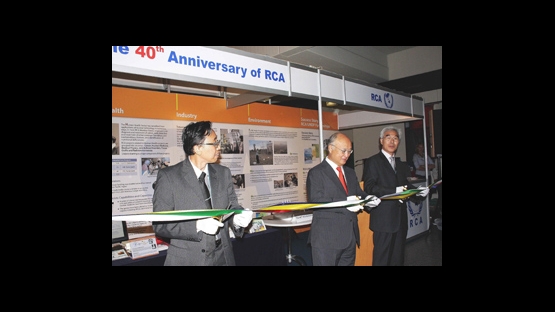Cooperative agreements that promote science and development in key regions around the world strengthen the work of the IAEA to spread the benefits of the peaceful applications of nuclear technology. The first such cooperative agreement is the Regional Cooperative Agreement for Research, Development and Training Related to Nuclear Science and Technology for Asia and the Pacific, more popularly known by the acronym RCA. This Cooperative Agreement dates as far back as 1972.
To mark the 40th anniversary of this land-mark Agreement, the RCA States Parties with the support of the IAEA Department of Technical Cooperation organized a panel discussion on 18 September focusing on the achievements and future of the cooperative agreement. Held as a side event during the 56th IAEA General Conference, it featured presentations from key speakers from the region on topics ranging from human health, food and agriculture, water and environment, and industrial applications.
RCA entered into force on 12 June 1972 with six participating countries: India, Indonesia, Philippines, Singapore, Thailand and Vietnam. In the years since then, the Agreement has continuously grown and evolved. It established a regional office in Daejon, Republic of Korea in 2002 and now counts 18 Member States. It also changed the focus towards enhanced strategic programme planning and increased ownership in implementation of cooperative activities. Its main goal remains the same: using targeted projects to promote active collaboration in priority areas related to applications of nuclear science and technology applications among countries in the Asia and the Pacific region sharing the same vision and the same interests.
Over 100 projects have successfully concluded under RCA, over the past four decades. (Read some successful outcomes of RCA projects here)
Although the IAEA is not party to the Agreement, it acts as a strategic partner and provides managerial, technical, administrative and financial support to the RCA. The Agency also plays an active role in encouraging policy dialogue on strategic aspects of the cooperative programme.
RCA Projects
RCA priorities cover a wide range of thematic areas. The cooperative projects are implemented through the IAEA Technical Cooperation programme mechanism, within four main sectors: agriculture, environment, human health and industry. (View a list of RCA project information for the public here)
Agriculture. Projects implemented through the RCA have been focusing on plant breeding, animal health and production, preservation of food, protection from invasive insect pests, soil and land use, and veterinary drug use in aquaculture.
Environment. The main goal of the RCA programmes in the field of environment has been to concentrate on the most pressing problems where nuclear techniques can offer a comparative advantage. One of these problems is air pollution, particularly affecting the industrial areas and the large cities. The use of nuclear techniques to detect the sources of air pollution is a first step in eliminating this problem. In the field of water, training and support in the application of isotope techniques have helped countries understand and manage water resources better. Nuclear techniques also provided countries with the necessary tools to increase supply of drinking water and to identify vital aquifer systems. Other projects have focused on helping countries monitor marine and coastal pollution.
Human Health. In the field of human health, the RCA-supported projects focus on assistance and training in radiation medicine, in radiation therapy and in nutrition. Through the agreement, thousands of people benefited from regional training courses in the fields of nuclear medicine and diagnostic imaging, applied radiation biology and radiotherapy, dosimetry and medical radiation physics and nutritional and health-related environmental studies.
Industry. The RCA has also been instrumental in helping the States Parties develop and use various industrial applications utilizing nuclear techniques. One example of such a successful application is radiation processing and treatment of various industrial materials. Through this treatment, engineers can cross-link products such as wires, cables and tubes. This technique has important uses in industry and technology. The RCA also supported regional projects in natural resource exploration and exploitation with the help of nuclear techniques.
For more information on the RCA Regional Cooperative Agreement, please visit their Website.


